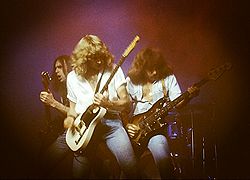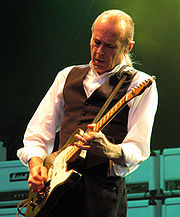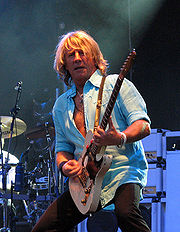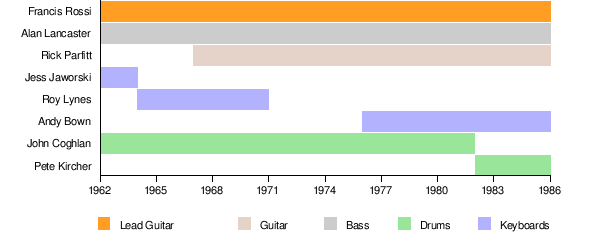Status Quo
| Status Quo | |
|---|---|
 |
|
| Background information | |
| Also known as | The Quo Quo The Scorpions The Spectres Traffic Traffic Jam The Status Quo |
| Origin | London, England |
| Genres | Rock, hard rock, boogie rock, psychedelic rock |
| Years active | 1967–present |
| Labels | Fourth Chord Sanctuary Eagle Polydor Vertigo Pye |
| Website | Status Quo Official Website |
| Members | |
| Francis Rossi Rick Parfitt Andy Bown John "Rhino" Edwards Matt Letley |
|
| Past members | |
| John Coghlan Alan Lancaster Pete Kircher Jeff Rich Roy Lynes |
|

Status Quo,[1] also known as The Quo or just Quo, are an English rock band whose music is characterized by their distinctive brand of boogie rock.[2]
The group's origins were in "The Spectres" founded by schoolboys Francis Rossi and Alan Lancaster in 1962.[3] After a number of lineup changes, the band became "The Status Quo" in late 1967, finally settling on the name "Status Quo" in 1970. They have recorded over 60 chart hits in the UK, more than any other rock group in history.[4] 22 of these have reached the UK Top Ten.[5]
Contents |
Formation
The origins of Status Quo were in the rock and roll freakbeat band "The Spectres" formed in 1962.[3] Francis Rossi and Alan Lancaster met at Sedgehill Comprehensive School, Catford, and were members of the same orchestra. They started a band called The Scorpions, later changing the name to "The Spectres". Rossi and Lancaster played their first gig at the Samuel Jones Sports Club in Dulwich, London. In 1963 they added drummer John Coghlan.[6] They began writing their own material and after a year met Rick Parfitt who was playing with a cabaret band called The Highlights. By the end of 1965 Rossi and Parfitt, who had become close friends, made a commitment to continue working together. On 18 July 1966 The Spectres signed a five-year deal with Piccadilly Records, releasing two singles that year, "I (Who Have Nothing)" and "Hurdy Gurdy Man" (written by Alan Lancaster), and one the next year called "(We Ain't Got) Nothin' Yet" (a song originally recorded by New York psychedelic band The Blues Magoos).[6] All three singles failed to make an impact on the charts.[3]
Early years
By 1967, the group had discovered psychedelia and changed their name to Traffic (later amended to Traffic Jam, to avoid confusion with Steve Winwood's Traffic).[3] At this time the line-up also included organist Roy Lynes. They released another single "Almost But Not Quite There" which was also a flop. In late 1967 the band became The Status Quo, and in January 1968 they released the psychedelic-flavoured "Pictures of Matchstick Men".[3] Rick Parfitt was invited to join the band just as the song hit the UK Singles Chart, reaching Number 7. "Matchstick Men" also became their only Top 40 hit single in the United States.[6] Though the follow up was the unsuccessful single, "Black Veils of Melancholy", they had a hit again the same year with the poppy, Marty Wilde penned "Ice in the Sun", which climbed to Number 8.[3] Although the group's albums have been released in the United States throughout their career, they have never achieved the same level of success and fame there that they have enjoyed in their home country.[6] After the breakthrough, the band management hired Bob Young as a roadie and tour manager. Over the years Young became one of the most important songwriting partners for Status Quo.
After their second album Spare Parts failed to impact commercially, the band, disillusioned with their musical direction, abandoned pop psychedelia and Carnaby Street fashions in favour of a hard rock/boogie sound, faded denims and T-shirts, an image which was to become their trademark throughout the 1970s.[3] Lynes left the band in 1971, to be replaced (in the studio) by guests including keyboard player Jimmy Horowitz and Tom Parker. By 1976, ex-The Herd and Judas Jump member Andy Bown was brought in to cover keyboards - although as he was contracted as a solo artist with EMI he was not credited as a full-time member until 1982.
Success
After two well-received but relatively poor selling albums in 1970 and 1971, their major breakthrough came when they signed with the heavy rock and progressive label Vertigo.[6] Their first album for Vertigo, Piledriver was released in 1972, and heralded an even heavier, self-produced sound.[3] This album was essentially the stylistic template for each album they released up until Blue for You in 1976.[6] During this period, and throughout the rest of the 1970s, they became one of the UK's leading rock bands, gaining a faithful following due to their relentless touring and energetic live gigs. Quo's more popular songs from this era include "Paper Plane" (1972), "Caroline" (1973), "Down Down" (1975), "Rockin' All Over the World" (1977) and "Whatever You Want" (1979). "Down Down" topped the UK Singles Chart in January 1975, becoming their only UK number one single to date.[7] In 1976, they signed a pioneering sponsorship deal with Levi's.[3] Quo have now sold in excess of 118 million records worldwide.[8]
Changes in line-up
From 1977 onwards, the band's sound became more polished as they began to employ outside producers. These included Pip Williams, Roger Glover, who was the first outside producer to work with Quo since Pye's John Schroeder in the early 1970s and produced "Wild Side of Life" and its B-side "All Through The Night" in 1976; and John Eden.
1977's Rockin' All Over the World's title track, a minor hit for its writer John Fogerty (formerly of Creedence Clearwater Revival) became one of Status Quo's most enduring anthems.[3] Sales remained high in the UK throughout the 1980s, but tensions within the band saw founding member John Coghlan leaving the band late in 1981.[6] His replacement was Pete Kircher from the 1960s pop band Honeybus.[6] This line-up played its last full-length gig in 1984 at the Milton Keynes Bowl, although the band were contracted to record more albums. Status Quo's final appearance with the Kircher line-up opened the Live Aid charity event at Wembley in July 1985.

That year, Rossi recorded and released two solo singles with long-time writing partner Bernie Frost. Parfitt also recorded a solo album, Recorded Delivery, with bass player John "Rhino" Edwards and drummer Jeff Rich. The album remains unreleased, although some tracks were reworked and released sporadically as Status Quo B-sides until 1987.
In mid-1985, Rossi, Parfitt and Bown, along with Edwards and Rich, started work on a new Status Quo album. Lancaster, who by this time had more or less settled in Australia, took out a legal injunction to stop the band from using the Status Quo name on any records, citing his increasing musical differences with the group, notably during the sessions for the 1983 album Back to Back. The specific dispute concerned two tracks which became hit singles for the group around that time. Lancaster had written the track "Ol' Rag Blues", but was angered when the producers chose to release a version with Rossi singing the lead vocal in preference to the one sung by himself. He also objected to the track "Marguerita Time", which he thought unduly corny and too pop-oriented for the band. This was underlined by his non-appearance on either the performance of the song on Top Of The Pops or its promotional video. The injunction also prevented the release of a single, "Naughty Girl", for which a catalogue number was issued by Vertigo.
An out-of-court settlement was made in January 1986, enabling the new Status Quo to continue recording the In The Army Now album, of which "Naughty Girl" was reworked as "Dreamin'". Lancaster remained in Australia, and in 1986 joined an Australian super group, The Party Boys, which featured Angry Anderson of Rose Tattoo, John Brewster of The Angels and Kevin Borich, but achieved little success outside Australia. Lancaster left Status Quo formally in 1987.

The late 1980s and 1990s
On 12 July 1986 they played at Queen's Live at Wembley '86 concert.[3] The commercially successful In the Army Now album was released in 1986, the single of the same name becoming one of the band's biggest selling UK singles, reaching number 2.[3] The following album, Ain't Complaining, released in 1988, was less successful but did produce the hit single "Burning Bridges" which got to number 5. This was later re-recorded (with new lyrics) in April 1994 with Manchester United F.C. as "Come on You Reds" technically giving the band their second UK Number 1, although the single was released as 'by Manchester United'.
The early-to-mid-1990s saw falling album sales for the band.[3] Don't Stop (1996), and Famous in the Last Century (2000) consisted almost entirely of cover versions, (with the only exception being the title track to the latter). The former brought some chart success for Quo with covers of Fleetwood Mac's "Don't Stop" and The Beach Boys' "Fun, Fun, Fun". The band became involved in an acrimonious dispute with Radio 1 after the station refused to include the "Fun Fun Fun" single on the radio station's playlist.[3]
In 1993, Francis Rossi and Rick Parfitt attracted a crowd of over 25,000 when they performed the annual Blackpool Illuminations lights switch on.
Parfitt underwent quadruple by-pass surgery in 1997 but was able to make a full recovery and returned with a performance at the Norwich City Football Club ground three months later. Rich left in 2000 and was replaced by Matt Letley. Andrew Bown also took a year off at the same time following the death of his wife, and was temporarily replaced on stage by Paul Hirsh, formerly of Voyager.
Status Quo in the 2000s

In recent years Status Quo have retained their loyal fan base in the United Kingdom, as well as their big followings in Scandinavia and mainland Europe, most notably in the Netherlands.
In November 2000, the band played a gig at Grandchester in the outback in Australia, performing on a carriage of Australia's Orient Express, the Great South Pacific Express.
In September 2005, a contestant on the long-running BBC television quiz programme Mastermind chose Status Quo as his specialist subject. That same year Rossi and Parfitt made cameo appearances in the long-running ITV soap opera Coronation Street in a storyline which involved them being sued by the notorious layabout Les Battersby, and performing live at his wedding as compensation.
In December 2005, it was announced that Parfitt had been taken ill and was undergoing tests for throat cancer. All subsequent dates of the UK tour were cancelled as a result. However, the growths in Parfitt's throat were later found to be benign and were successfully removed. In May 2006 a fully recovered Parfitt and the band returned to the NEC Birmingham to play the show that they had postponed in December. This was their 40th show at the venue, and was recorded for a DVD, entitled "Just Doin' It".
On the 1 July 2007, they performed in front of 63,000 people at the newly built Wembley Stadium as part of the Concert for Diana. They also appeared on the TV program Tiswas Reunited, in which the band got the usual greeting of custard pies and buckets of water whilst playing the song Gerdundula.
Their latest studio album, In Search of the Fourth Chord, was released on the band's own Fourth Chord label in September 2007 in the UK and on Edel Records in the rest of Europe. Produced by veteran producer Pip Williams, who had worked with Quo in the studio since 1977, the album was only moderately successful.
In 2008, they teamed up with German techno group Scooter to record a jumpstyle version of their 1979 single "Whatever You Want" entitled "Jump That Rock (Whatever You Want)".[9] In December 2008, they released their 75th single and first Christmas single, entitled "It's Christmas Time", which peaked at No.40 in the UK Singles Chart.[10]
In August 2009, Status Quo returned to Northern Ireland to play in Carrickfergus. Other acts included Imelda May, Simon McBride and Jools Holland.[11]
According to the latest issue of the Status Quo fan club's magazine, From The Makers Of, the band will go into the studio in April to begin recording their 29th album.

Status Quo played at the 2009 Glastonbury Festival on 28 June,[12] and at the separately held Glastonbury Abbey Extravaganza in August 2009.[13]
Status Quo in the 2010s
Rossi and Parfitt were awarded the OBE in the New Year Honours 2010 for their services to music. Their long-standing work for charities includes The Prince's Trust, British Heart Foundation and Nordoff-Robbins Music Therapy.
According to the latest issue of the Status Quo fan club's magazine, From The Makers Of, the band will go into the studio in April to begin recording their twenty ninth album.
Classic Rock magazine reported on 17 March 2010 that the band has patched up their relationship with Alan Lancaster, and are discussing the possibility of a collaboration in the future. The article stated "While the band are back on friendly terms with Alan, it's unlikely we'll see any future reunion, with Quo continuing as normal and Lancaster busy with charity events and overseeing the activities of his son's band The Presence".
On 26 September 2010, Status Quo will release a new version of "In The Army Now" through Universal / UMC. All profits from this updated and lyrically-reworked version will be donated equally to the British Forces Foundation and Help For Heroes charities. A Facebook campaign page titled "Get the new version of In The Army Now to No.1" has been set up.
Band members
1962-1985

1986-present

Discography
Remakes and cover versions
- In 1989, American alternative rock group Camper Van Beethoven scored a number one hit on Billboard magazine's Modern Rock Tracks chart with a cover version of "Pictures of Matchstick Men". The song is from their critically acclaimed album Key Lime Pie.
- The 1996 re-issue of the album Too-Rye-Ay by Dexys Midnight Runners contains a cover version of "Marguerita Time".
- Ozzy Osbourne, backed by Type O Negative, covered "Pictures of Matchstick Men" as part of the soundtrack to the Howard Stern biographical movie Private Parts in 1997.
- Dr. Feelgood, covered "Gerdundula" after Rossi suggested it to them on their shared tour in 2001.
- At the 2005 London Live 8 concert Coldplay's Chris Martin sang the chorus to "Rockin' All Over the World" in their song, "In My Place", in reference to Status Quo having opened Live Aid with "Rockin' All Over The World"
- Oakland, California-based electronica/dance/pop group Persephone's Bees covered "Paper Plane" on their 2006 album Notes from the Underworld.
- Towards the end of his life, DJ John Peel was known for playing "Down Down" as part of his eclectic DJ sets.[14]
- Since their 2004 Football League Trophy exploits, Southend United F.C. fans have made an anthem for themselves by singing "Shrimping All Over the World", to the melody of "Rockin' All Over the World".
- Arjen Lucassen (from the Dutch project Ayreon) covered "Pictures Of Matchstick Men" on the solo album Strange Hobby.
- Muse have been known to play a riff from "Burning Bridges" in their live sets.
- Folk metal band Mägo de Oz recorded an instrumental version of "Gerdundula" on their La Bruja EP.
- Celtic music ensamble Luar Na Lubre also covered "Gerdundula" on the album Camiños Da Fin Da Terra.
- Spanish rock band Platero y Tu did a Spanish cover of "Rockin' All Over the World", titled "Si Tu te Vas", on their album Voy a acabar borracho.
- German techno band Scooter sampled "Whatever You Want" on the song "Jump That Rock!" from the 2008 UK version of their album Jumping All Over the World.
- Dutch football club Vitesse has a cover version of "Whatever You Want", entitled "Daar zijn de boys", as their home song.
- Norwegian pop/rock band D.D.E. has a cover version of "Whatever You Want", on their live album "Det e D.D.E. (1995)" entitled "Ka e det du vil".
- Bad Religion guitarist Brett Gurewitz recorded a cover version of "Pictures of Matchstick Men" on his 1985 solo album Seeing Eye Gods.
References
- ↑ pronounced as "state-us"
- ↑ "Status Quo : Overview". Allmusic. http://www.allmusic.com/cg/amg.dll?p=amg&sql=11:apfexq95ldde. Retrieved 2009-05-03.
- ↑ 3.00 3.01 3.02 3.03 3.04 3.05 3.06 3.07 3.08 3.09 3.10 3.11 3.12 3.13 Roberts, David (1998). Guinness Rockopedia (1st ed.). London: Guinness Publishing Ltd.. p. 417. ISBN 0-85112-072-5.
- ↑ "Status Quo hold UK singles record". BBC News. 19 September 2005. http://news.bbc.co.uk/1/hi/entertainment/music/4259312.stm. Retrieved 2009-02-14.
- ↑ UK Chart Stats
- ↑ 6.0 6.1 6.2 6.3 6.4 6.5 6.6 6.7 Strong, Martin C. (2000). The Great Rock Discography (5th ed.). Edinburgh: Mojo Books. pp. 927–929. ISBN 1-84195-017-3.
- ↑ Rice, Jo (1982). The Guinness Book of 500 Number One Hits (1st ed.). Enfield, Middlesex: Guinness Superlatives Ltd. p. 164. ISBN 0-85112-250-7.
- ↑ "Status Quo factsheet from the band's official website". http://www.statusquo.co.uk/factsheet.htm.
- ↑ Scooter Vs Status Quo ScooterTechno.com
- ↑ It's Christmas Time Statusquo.co.uk
- ↑ Gigging Northern Ireland talks to Francis Rossi of Status Quo GiggingNI.com
- ↑ Glastonbury Festivals - Line-Up Glastonburyfestivals.co.uk
- ↑ Virtualfestivals.co.uk
- ↑ "John Peel's comments on playing 'Down Down', in The Guardian". London. 7 December 2002. http://arts.guardian.co.uk/features/story/0,,855214,00.html. Retrieved 24 May 2010.
Literature
- John Shearlaw, Bob Young: Again & Again. Sidgwick & Jackson, October 1984, Paperback, ISBN 0283991011 (1st edition (1979) and 2nd edition (1982) as The Authorised Biography by John Shearlaw)
- Tom Hibbert: Status Quo. Omnibus Press, 1982, ISBN 0-86001-957-8
- Neil Jeffries: Rockin' All Over the World. Proteus Books, March 1985, Paperback, ISBN 0-862-76272-3
- Bob Young: Quotographs - Celebrating 30 Years of Status Quo, IMP International Music Publications Limited, 1985, ISBN 1-859-09291-8
- Francis Rossi, Rick Parfitt: Just For The Record. Bantam Press, September 1994, hardcover, ISBN 0-593-03546-1
- Patti Parfitt: Laughing All over the World: My Life Married to Status Quo. Blake Publishing Ltd, Oktober 1998, ISBN 185782198-X
- David J. Oxley: Rockers Rollin' - The Story of Status Quo. ST Publishing, Januar 2000, Paperback, ISBN 1-898927-80-4
- David J. Oxley: Tuned To The Music of Status Quo. ST Publishing, 2001, Paperback, ISBN 1-898927-90-1
- Francis Rossi, Rick Parfitt, Mick Wall: Status Quo. XS All Areas. Sidgwick & Jackson, September 2004, hardcover, ISBN 0283073756 (paperback edition: Macmillan Publishers Ltd, August 2005, ISBN 0330419625)
- Francis Rossi, Rick Parfitt, Bob Young: „Status Quo“: The Official 40th Anniversary Edition . Cassell Illustrated, Oktober 2006, hardcover, ISBN 9781844035625.
- Status Quo: La Route Sans Fin, foreword by Bob Young - ISBN 2-910196-42-9
External links
- Status Quo official website
- BBC Norfolk: Status Quo gig gallery - Thetford Forest 2008
- Status Quo's Francis Rossi talking to Gigging Northern Ireland
|
||||||||||||||||||||